- Home
- Technical Cooperation Projects
- Index of Countries
- Asia
- Viet Nam
- Project for Sustainable Natural Resource Management (SNRM)
- Project News
- Training in Japan - Vietnamese officials visited Japan for the training on forest management and livelihoods development.
Project News
2019-03-04
Training in Japan - Vietnamese officials visited Japan for the training on forest management and livelihoods development.
From February 25th to March 2nd, a group of Vietnamese officials from both central and provincial levels visited Japan to learn Japan's sustainable forest management and local resource utilization. This training was organized with supports from national and prefectural authorities and private sector in Wakayama and Osaka prefectures.
In Vietnam, degradation of forest has been advancing due to various causes, such as over-exploitation and conversion to agricultural land, mainly in mountainous areas where many poor households live. In order to manage forests in a sustainable manner, it is very important to provide local residents with a steady means of alternative livelihood for reducing the pressure on existing forest. Furthermore, they have a lot of difficulties in selling their agricultural products, which are main income in mountainous areas, due to poor processing systems and limited access to markets. The aim of this training is to learn applicable countermeasures for addressing these challenges from Japan's good practices.
At first, the trainees learned about "Minabe-Tanabe Ume System" registered as the World Agricultural Heritage, and visited a plum farm, a plum processing factory and a kiln that produces Bincho charcoal in Tanabe City, Wakayama Prefecture. They were strongly impressed by the production system which has harmonized combination of various elements such as plum farms, firewood charcoal forest, bees for pollination, grass on slopes and groundwater. Some trainees remarked that they wanted to proactively promote the plum production and processing in Vietnam.
Then, the trainees learned about the overview of Japanese forestry policy and the utilization of the forest environmental tax of Wakayama Prefecture, and visited the World Heritage namely "Sacred Sites and Pilgrimage Routes in the Kii Mountain Range" and the forest plantation established in cooperation with a private company. The trainees, who are first-line officials engaged in forestry policy, asked about a wide variety of questions, such as system of forest management, status of timber production and processing, land use and administrative organizations.
The trainees visited a winery that inherited a history of grape production in Kashiwara City, Osaka Prefecture. One of trainees remarked that the ingenuity of inviting customers from all over the world through the mass media would be also useful in Vietnam.
Finally, the trainees discussed how the knowledge learned from the training could be applicable in Vietnam. They enthusiastically discussed specific ideas, for example, attracting processing facilities, promoting land allocation to local people and establishing funds and/or organizations to support farmers.
In Japan, the area of forests is increasingly left abandoned in rural areas with declining and aging population. On the other hand, in Vietnam, degradation of forest is advancing with pressure of population increase / overuse. Both countries established new forestry laws in order to address these issues and to overcome a huge turning point for forestry sector. We believe this training has provided an excellent opportunity for two countries to enhance the good partnership for addressing these challenges.
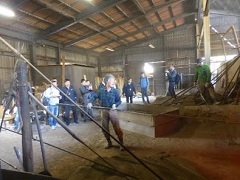 Visit to a charcoal kiln.
Visit to a charcoal kiln.
Fortunately, we were able to see the final process of Bincho charcoal namely "Kamadashi (pulling charcoal out of a kiln)" on the day.
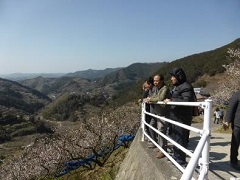 Tanabe plum farm in full bloom.
Tanabe plum farm in full bloom.
Not only plum production but also blooming plum flowers, which attracts many tourists, contribute to the local economy.
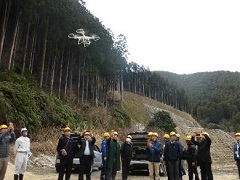 A drone flight at the forest conservation site.
A drone flight at the forest conservation site.
The mobility of drone is very useful for a damage survey after natural disaster and a progress check of construction in mountainous areas.
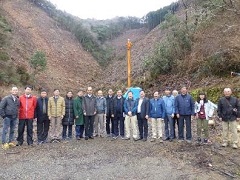 Group photo at a logging site.
Group photo at a logging site.
You can see a tower yarder (a machine used to collect logged wood in steep slopes) in the back of the photo.
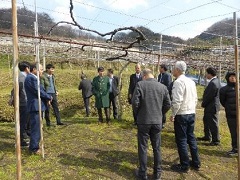 Visit to the vineyard.
Visit to the vineyard.
The trainees were overwhelmed by listening to the story that tourists came to drink unique wine here from all over the world.
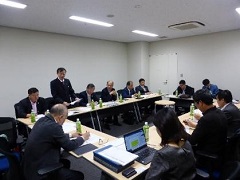 Presentation of training results.
Presentation of training results.
- About JICA
- News & Features
- Countries & Regions
- Our Work
- Thematic Issues
- Types of Assistance
- Partnerships with Other Development Partners
- Climate Change / Environmental and Social Considerations
- Evaluations
- Compliance and Anti-corruption
- Science and Technology Cooperation on Global Issues
- Research
- JICA Development Studies Program / JICA Chair
- Support for the Acceptance of Foreign HRs / Multicultural and Inclusive Community
- Publications
- Investor Relations
